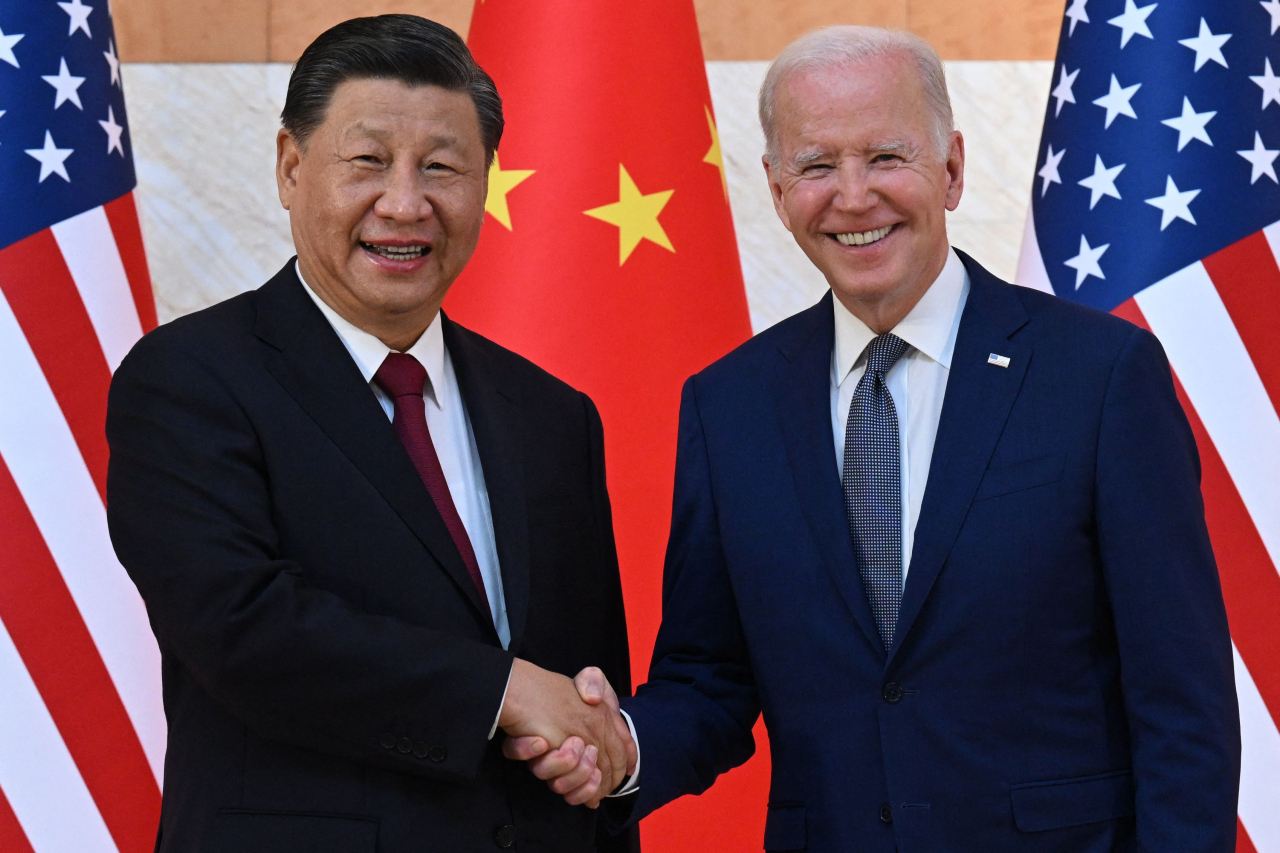 |
US President Joe Biden and Chinese President Xi Jinping hold hands during their first in-person bilateral summit in Bali, Indonesia on Monday. (Yonhap) |
US President Joe Biden and Chinese President Xi Jinping held their first in-person bilateral summit on Monday, where they each showed a desire to improve US-China ties that have hit rock bottom in recent years.
While they continue to stand at odds on key issues, including Taiwan, experts assess that Monday's summit will positively improve bilateral ties and reduce tensions.
On the eve of the Group 20 Summit in Bali, Indonesia, Biden and Xi met for about three hours, according to officials.
In the first US-China summit since January 2017, the two leaders agreed on the need to reduce tensions in their bilateral relations, and to work together to address transnational challenges.
In that effort, they said they would have senior officials maintain communication to deepen constructive efforts on a wide range of issues, including climate change, global macroeconomic stability including debt relief, health security, and global food security, the White House readout of the meeting said.
According to a readout of the summit, Biden told Xi that the US will continue to “compete vigorously” with China. At the same time, the US and China must manage the competition responsibly, and maintain open lines of communication so that the competition do not veer into conflict, Biden said.
Xi also pointed out that the current bilateral relations the two countries have “is not in the fundamental interest of the two countries and peoples, and is not what the international community expects.”
So for the world and for the people, they should find the right way to get along with each other and “bring it back to the track of healthy and stable growth” for everyone’s benefit, Xi said.
The two leaders also agreed that their respective countries should work together to tackle transnational challenges, of such as climate change,
“China-US relations should not be a zero-sum game where one side out-competes or thrives at the expense of the other,” Xi said.
“The successes of China and the United States are opportunities, not challenges, for each other. The world is big enough for the two countries to develop themselves and prosper together,” he added.
As the two leaders confirmed of their desires to improve ties, they still were at odds over a series of pending issues, including the security situation of Taiwan.
While the US president reiterated the US upholds the one China policy, he objected to the "coercive" and "increasingly aggressive" actions of Beijing toward Taiwan. He said those hostile actions undermine peace and stability across the Taiwan Strait and in the broader region, and jeopardize global prosperity.
Biden also raised concerns over Beijing's conduct harming human rights in Xinjiang, Tibet, and Hong Kong, and also pointed out China's non-market economic practices harm workers and families in America and around the world.
Xi gave a "full account" of the origin of the Taiwan issue, and China's principled position, according to the China's State Council.
Stressing that the Taiwan question is at the very core of China's core interests, Xi said it is "the first red line" that must not be crossed in China-US relations.
Xi also stressed that China also supports and is committed to peace and stability across the Taiwan Strait, but that and the idea of Taiwan independence are as "irreconcilable as water and fire."
The two leaders agreed that a nuclear war should never be fought and can never be won. They also underscored their opposition to the use or threat of use of nuclear weapons in Ukraine.
But as the White House readout explained how Biden criticized North Korea's military provocation and urged for China to play a "constructive role" to deter Pyongyang's threats, China's side did not mention about it.
Experts viewed Monday's summit as an opportunity for the two sides to explore their desires for improvement in their bilateral relations.
“In several months, we may look back on the Biden-Xi meeting as the first signs of an inflection point that began to decelerate the spiral towards conflict,” Jessica Chen Weiss, a China expert at Cornell University, said in an interview with the Financial Times.
“It’s encouraging that both sides agreed to empower senior officials to develop foundational principles for the relationship and working groups to make progress on specific issues,” Chen Weiss added.
Citing analysts’ opinions, China’s state-operated English news outlet Global Times said the Monday’s bilateral summit plays positively for the relations of the two countries.
While tension remains between the two countries, Xi-Biden summit sent a “positive signal” to the world, that the world’s two biggest economies remain in communication and share the consensus of avoiding direct conflict, the Global Times said.







